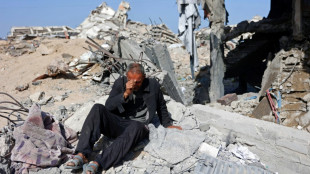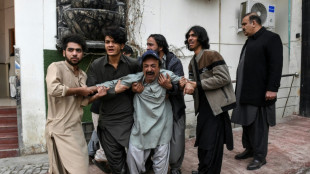

Sudan's RSF declares truce after army rejects US plan
Sudan's paramilitary Rapid Support Forces on Monday announced a unilateral three-month ceasefire a day after the army dismissed a US truce proposal from international mediators.
The RSF, which has been fighting Sudan's regular army since April 2023, said it was declaring the ceasefire "in response to international efforts, including the initiative of US President Donald Trump and the Quad mediators".
The Quad group comprises the United States, Saudi Arabia, the United Arab Emirates and Egypt.
The RSF move came after the UAE lambasted army chief Abdel Fattah al-Burhan for rejecting the US truce proposal and accusing Washington of echoing Emirati positions on the conflict.
The UAE has been widely accused of arming the RSF, but Abu Dhabi has repeatedly denied the charge.
On Monday, the RSF announced "a humanitarian truce providing for a cessation of hostilities for three months".
The announcement was made in a recorded video message by Burhan's former deputy and now bitter rival, RSF commander Mohamed Hamdan Daglo.
On Sunday, Burhan called a truce proposal sent by US envoy Massad Boulos on behalf of the Quad group of mediators the "worst yet" and unacceptable to his government, which is based in Port Sudan on the Red Sea.
The army chief called the Quad group "biased" as long as the UAE was a member, and accused Boulos of parroting talking points from Abu Dhabi.
On Monday, the UAE's minister of state for international cooperation, Reem bint Ebrahim Al Hashimy, lambasted Burhan for demonstrating "consistently obstructive behaviour".
"This must be called out," Hashimy said.
Rejecting the US plan, Burhan said the proposal "eliminates the armed forces, dissolves security agencies and keeps the militia where they are".
- Civilian rule -
On November 6, the RSF announced they had agreed to a proposal for a humanitarian truce put forward by the international mediators.
The army-aligned government had rejected an earlier plan in September that would exclude both the military and the RSF from Sudan's post-war political process.
That proposal included a three-month humanitarian truce, followed by a permanent ceasefire and a nine-month transition to civilian rule.
Last week, Trump said he would move to end the Sudan war, after Saudi Crown Prince Mohammed bin Salman urged him during a visit to Washington to get involved.
Burhan thanked the two leaders for what he called their "honest" initiative, but urged mediators to "come with a positive and proper approach".
Among the general's criticisms of the US proposal were claims that it "eliminates the armed forces, dissolves security agencies and keeps the militias where they are" without disarming them.
Reiterating that the conflict was "a war for survival", he insisted that any peace agreement must compel the RSF to withdraw fully from captured territory and be confined to designated zones.
Burhan also attacked repeated claims by Daglo that the army is controlled by the Islamist Muslim Brotherhood.
"Where are these so-called members of the Muslim Brotherhood within the Sudanese army? We do not know them. We only hear such claims in the media," Burhan said.
Daglo on Monday said the RSF was open to talks with "all actors except for the terrorist Islamist movement of the Muslim Brotherhood and the National Congress", the now-banned party of former Sudanese leader Omar al-Bashir.
Daglo worked for years for Bashir before allying with Burhan to overthrow him in 2019 as part of Sudan's revolution. The pair then snuffed out Sudan's fledgling civilian government.
International attention on the conflict has increased since the RSF seized the key Darfur city of El-Fasher last month after a relentless siege that has sparked warnings of crimes against humanity and genocide.
Over the past two years, the warring parties in Sudan have violated every ceasefire agreement, with negotiations to halt the war yet to make any breakthroughs.
M.Ferraro--GdR



